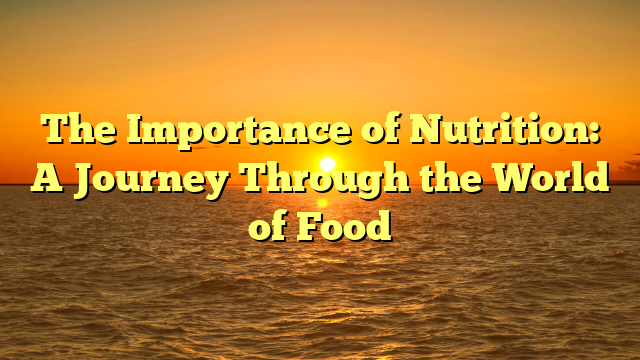
Food is not just a means of survival; it is a source of pleasure, cultural identity, and
connection. The diversity and richness of food reflect the myriad experiences, traditions, and
histories that come together on our plates. From the humble ingredients found in a home
kitchen to elaborate dishes served in fine dining establishments, food plays a central role in
our daily lives and provides an endless source of exploration. This article delves into the
multifaceted nature of food, exploring its nutritional value, cultural significance, and the ways
it brings people together.
The Nutritional Power of Food
At its core, food serves the fundamental purpose of providing the nutrients our bodies need
to thrive. The human body requires a variety of nutrients to function optimally, including
carbohydrates, proteins, fats, vitamins, and minerals. These components are the building
blocks for energy production, tissue repair, immune system support, and overall health.
Carbohydrates, often seen as a source of energy, are found in foods such as bread, rice,
pasta, fruits, and vegetables. They are broken down by the body into glucose, which fuels
our cells, muscles, and organs. Proteins, made up of amino acids, are crucial for the growth
and repair of tissues. Foods like meat, fish, eggs, beans, and nuts are excellent sources of
protein, contributing to muscle development and immune function.
Fats, though often misunderstood, are essential for proper cell function, hormone production,
and the absorption of fat-soluble vitamins like A, D, E, and K. Healthy fats can be found in
foods like avocados, olive oil, nuts, and fatty fish. Meanwhile, vitamins and minerals are key
to supporting processes such as bone health (calcium), red blood cell production (iron), and
immune function (vitamin C and zinc).
With the increasing availability of processed foods, there has been a growing emphasis on
the importance of balanced diets that prioritize whole foods. Vegetables, fruits, legumes, and
whole grains should make up a significant portion of one’s daily intake. Incorporating a
variety of food types into one’s meals ensures that the body receives a wide range of
nutrients, reducing the risk of deficiencies and promoting overall well-being.
The Role of Food in Culture and Tradition
Beyond its nutritional benefits, food is inextricably tied to cultural identity and traditions. The
foods we eat are often a reflection of where we come from, the customs passed down
through generations, and the ways our ancestors survived and thrived in different
environments. Every culture around the world has developed unique culinary traditions
based on geography, climate, and available resources.
For example, in Italy, food is synonymous with family and celebration. Pasta, pizza, and
risotto are staples of Italian cuisine, each dish crafted with love and attention to detail. Italian
food is about simplicity and quality ingredients, where a few well-chosen elements are
combined to create dishes that are both flavorful and satisfying. The Mediterranean diet, rich
in fruits, vegetables, olive oil, and lean protein, is renowned for its health benefits,
particularly in preventing heart disease and promoting longevity.
In Japan, food is a reflection of harmony with nature and seasonality. Dishes like sushi,
sashimi, and tempura showcase fresh, high-quality ingredients prepared with care.
Japanese cuisine places a strong emphasis on balance, not just in flavors but in colors and
textures. Rice, fish, vegetables, and pickled items form the core of most meals, with each
element carefully chosen to complement the others.
In India, the diverse array of spices and flavors that characterize the cuisine tells a story of
centuries of cultural exchange. Indian food is known for its complexity, with dishes ranging
from rich and creamy curries to light and aromatic stews. Spices such as turmeric, cumin,
coriander, and cardamom not only enhance the taste of food but are also known for their
medicinal properties.
Food also plays a vital role in religious and spiritual practices. In Hinduism, food is
considered a form of worship, with offerings made to deities during festivals. In Jewish
traditions, kosher dietary laws dictate what is permissible to eat, emphasizing purity and
cleanliness. In Christianity, the act of sharing bread and wine during the Eucharist is a
symbol of community and faith.
Food as a Social Connector
Food has an unparalleled ability to bring people together. Whether it is a casual meal shared
among friends or a grand feast celebrating a special occasion, eating is often a communal
experience. The act of sharing food fosters a sense of connection and belonging,
transcending language, cultural, and geographical barriers.
Family meals have long been a cherished tradition across the globe. In many households,
mealtime is a time for conversation, bonding, and reconnecting after a busy day. slot deposit 25 bonus 25 , often considered the heart of the home, serves as a place where family members
gather to prepare and enjoy meals together. These shared moments create lasting
memories and reinforce social bonds, with recipes and cooking techniques passed down
through generations.
In modern society, food also serves as a way to explore new cultures and build relationships.
Dining out at a restaurant offers an opportunity to experience flavors from around the world
without leaving one’s hometown. The growing popularity of food festivals, cooking classes,
and culinary tours allows people to immerse themselves in the global food scene,
exchanging ideas and fostering greater understanding.
Social media platforms have further amplified food’s role as a connector. With the rise of
food photography and influencers, people are more likely to share their culinary experiences
online, creating a sense of community through virtual interactions. Recipes are exchanged,
cooking tips are shared, and food trends go viral, all helping to cultivate a shared passion for
food.
Conclusion
Food is far more than just a basic need; it is a powerful force that nourishes our bodies,
shapes our cultures, and brings people together. The global diversity of food traditions
showcases the creativity and ingenuity of human societies, while also offering countless
ways to explore new flavors, techniques, and customs. As we continue to navigate a
fast-paced world, it is important to remember the joy, connection, and health that food
provides. It is a universal language that transcends time, place, and identity, making it an
essential part of the human experience.




